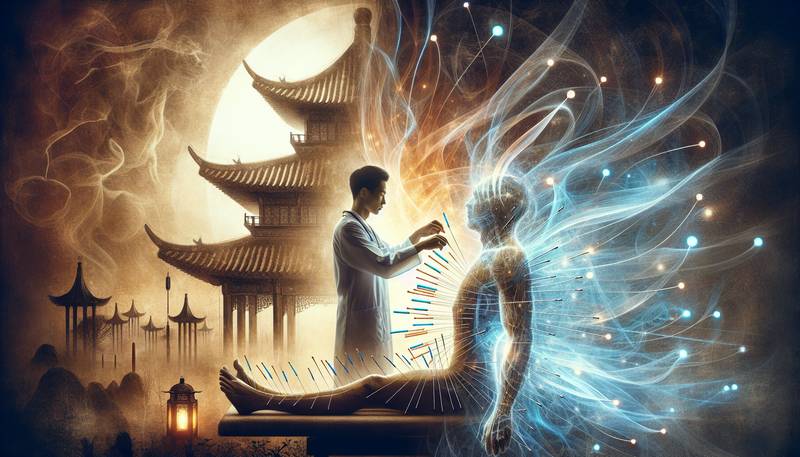Acupuncture and Chronic Pain Management: Traditional Meets Modern

A Brief History of AcupunctureBefore we dive headfirst into the sordid world of chronic pain management, let us first take a brief detour through the annals of history to understand the origins of acupuncture. As a millennial practice, acupuncture had its roots in ancient China, where it was believed that illnesses were caused by imbalances in the mystical life force known as Qi. To rectify these imbalances, practitioners would pierce the skin with long, thin needles at specific points called meridians, thereby restoring the flow of Qi and curing the patient of their ailments.This practice spread like wildfire through the Eastern world, captivating the attention of emperors and peasants alike. The advent of modern medicine saw acupuncture fall out of favor, particularly in the West. However, the 20th century witnessed a resurgence of interest in this ancient art, due in no small part to a certain Richard Nixon and his historic visit to China in 1972. It was during this visit that a New York Times reporter underwent an emergency appendectomy, with acupuncture as the sole method of anesthesia. The ensuing publicity brought acupuncture back into the global spotlight, where it remains to this day.Acupuncture and Chronic Pain Management: A Match Made in Heaven?Fast forward to the present day, where chronic pain holds the title of Public Enemy No. 1. This ubiquitous foe wreaks havoc on the lives of countless individuals, causing untold suffering and costing billions in healthcare and lost productivity. Conventional medicine has tried and failed to tame this beast, resorting to the use of powerful and highly addictive opioids in a desperate bid to provide relief. The stage was thus set for a hero to emerge, and acupuncture, dressed in its age-old garb, stepped into the fray.After years of skepticism, modern science has finally begun to embrace acupuncture as a viable method of pain management. Numerous studies have demonstrated its efficacy in alleviating a range of conditions, including chronic lower back pain, migraines, and osteoarthritis. This newfound acceptance has seen acupuncture clinics spring up like mushrooms after a rainstorm, offering an alternative to the endless cycle of opioids and their associated side effects.But How Does Acupuncture Actually Work?Despite its increasing popularity, the exact mechanisms by which acupuncture reduces pain remain somewhat elusive. One theory posits that the needles stimulate the release of endorphins, the body's natural painkillers. Another contends that the needles interfere with the transmission of pain signals to the brain by blocking the so-called "pain gate."Regardless of the precise details, one thing is clear: acupuncture has established itself as a viable weapon in the arsenal against chronic pain. So much so that even the National Institutes of Health has endorsed acupuncture as a complementary therapy for the management of chronic pain.Acupuncture: The Good, The Bad, and The UglyThough the benefits of acupuncture are well-documented, it is by no means a panacea for all forms of chronic pain. For some patients, the mere thought of needles is enough to induce a bout of cold sweats and heart palpitations. Others may find that their pain is simply too stubborn to be vanquished by the ancient art. As with all forms of treatment, acupuncture is not without its potential downsides.That being said, acupuncture has been shown to be a safe and effective method of pain relief for many individuals. For those averse to the needle, fear not! Modern acupuncturists have been known to employ alternative methods such as laser stimulation and acupressure, which can offer similar benefits without the pointy bits.Final Thoughts on Acupuncture and Chronic Pain ManagementAs the opioid crisis continues to rage on, the need for alternative methods of chronic pain management has never been more pressing. Acupuncture, that ancient art with its roots in the mystical East, has emerged as a potential contender in this battle against pain. While it may not be the miracle cure that some have hailed it to be, acupuncture has proven itself to be a valuable ally in the fight against chronic pain.So if you find yourself plagued by the persistent specter of pain, why not give acupuncture a try? It may not offer the instant gratification of a pill, but it just might provide the long-term relief that you've been seeking. After all, when traditional meets modern, anything is possible.Practical Advice for Acupuncture Newbies- Do your due diligence and find a qualified acupuncturist. Ask for recommendations and check their credentials.
- Be prepared to answer questions about your medical history and current health. This information will help your acupuncturist to tailor the treatment to your specific needs.
- Understand that acupuncture is not a one-shot deal. While some patients may experience immediate relief, others may require multiple sessions to achieve the desired results.
- Keep an open mind. Acupuncture may not work for everyone, but it's worth a try if conventional treatments have failed to provide relief.
|
|







